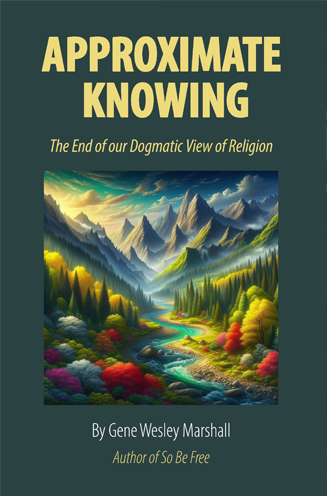 I, Gene Marshall, wrote Approximate Knowing, to be part of the answer to the question of what courses are best for us to teach to people who have become unfamiliar with Christian stories or quite wrongly understood them. I see this book containing three courses that deal with the three most important spirit topics many people struggle with in the 2020s.
I, Gene Marshall, wrote Approximate Knowing, to be part of the answer to the question of what courses are best for us to teach to people who have become unfamiliar with Christian stories or quite wrongly understood them. I see this book containing three courses that deal with the three most important spirit topics many people struggle with in the 2020s.
- What is religion and why do we need it?
- How is the Old Testament foundational for a Christian faith?
- How is the New Testament to be unscrambled from its misunderstandings?
Here are my outlines for teaching these three courses:
8 one-hour sessions on Natural Intelligence and Religion
pages xi-xxv Session 1. The Land of Mystery
pages 1 -10 Session 2. Natural Intelligence in the Human Species
pages 11-20 Session 3. The Wonder Level of Human Intelligence
pages 21-32 Session 4. Four Approaches to Truth
pages 67-84 Session 5. Three Primal Religious Metaphors of Antiquity
pages 85-97 Session 6. Three More Primal Religious Metaphors
pages 99-115 Session 7. More about Primal Religious Metaphors Today
pages 115-124 Session 8. More about All Religious Metaphors
8 one-hour sessions on Old Testament Stories
pages 127-137 Session 1. Awesome Mystery, Creator & Creation
pages 138-145 Session 2. Psalms on the Ongoing Creation
pages 145-150 Session 3. Adam & Eve—Confessing our Fall from Realism
pages 150-159 Session 4. Abraham, Sarah, & others—Return from the Fall
pages 159-166 Session 5. Moses and Joshua—Big Steps in Realism
pages 166-175 Session 6. Amos, Hosea, and Isaiah—Seeing the Big Picture
pages 175-181 Session 7. Jeremiah & Ezekiel—Handling Ultimate Crisis
pages 181-184 Session 8. Second Isaiah—Rebuilding Vanguard Community
6 one-hour sessions on New Testament Stories
pages 185-193 Session 1.Good News: Matthew, Mark, Luke, & John
pages 193-195 Session 2. Jesus & the Kingdom of God; Peter at Pentecost
pages 196-205 Session 3. Paul ’s Theologizing about God and sin
pages 205-212 Session 4. God is in Christ Reconciling the World to God
pages 213-218 Session 5. Mark and the Molding of Christianity Part One
pages 219-229 Session 6. Mark and the Molding of Christianity Part Two
The first of these three courses is not about an explicit Christian practice, but about the more general topic: What is religion in a general human sense? This may be a more gentle introduction for some people who have an aversion or a disinterest in anything named “Christian.” This course may, however, be rather demanding philosophically for other persons.
The second of these three courses may be the most accessible of the three to those people who have a positive wish to explore a fresh Christian practice and may be less drawn to something so basically philosophical as course one.
The third of these three courses is the one we renewers of Christianity need to teach in order to assist people to leap into a fresh practice of Christianity. We need to teach all three of these courses eventually.
Because there is resistance in ourselves and in our culture to a fresh adventure in Christian practice, we can postpone too long getting around to witnessing to a fresh Christian faith. Also, many social topics seem urgent and reforming Christianity can seem less urgent. It is true that reforming Christianity is a long-range task, but in the long haul it is important to all the other topics. The inner lives of a culture of people will be the creativity and the willingness to deal with the urgent topics in a more than superficial way.
Approximate Knowing: The End of our Dogmatic View of Religion
By Gene Wesley Marshall
Softcover | 6 x 9in | 264 pages | ISBN 9781663262806
E-Book | 264 pages | ISBN 9781663262813
Available at Amazon and Barnes & Noble
About the author
Gene Wesley Marshall is, in 2024, a 92-year-old religious teacher who began his education at Oklahoma State University as a mathematician and physicist. In 1953, he decided to leave a mathematics career and attend seminary at Perkins School of Theology in Dallas, Texas. He has served as a local church pastor, a chaplain in the army, and in 1962 joined a religious order of families (the Order: Ecumenical). For six years, he served as dean of the Ecumenical Institute’s eight-week residential “Academy” that trained leadership for religious and social engagements with participants from many parts of the world. He also traveled the United States, Latin America, Europe, India, Hong Kong, and Australia as a teacher and lecturer on religious and social ethics topics. In the early 1960s, he was an active participant in the civil rights revolution, serving for two years as the Protestant executive of the National Conference on Religion and Race. In the mid-1980s, he was one of the organizers of the bioregional movement. Beginning in 1983, he and his wife Joyce Marshall organized a non-for-profit educational organization, “Realistic Living,” and began co-teaching innovative programs and workshops plus publishing journals, books and essays. The Marshalls live in Bonham, Texas, in a straw-bale house.